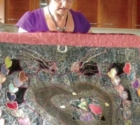
THE TREATMENT OF INFERTILITY WITH CHINESE MEDICINE
Mrs P was 41 years old when she first came for a consultation. She had been trying to get pregnant for six years and had suffered one miscarriage during that time. She had previously taken Clomid (Clomiphene Citrate) and was planning to begin IVF (in vitro fertilization) in a few months time. In a final attempt to get pregnant she came to see me to find out how Chinese medicine might be able to help. I recommended regular acupuncture treatments and herbal formulas for different stages of her menstrual cycle. I also referred her to a nutritionist colleague for advice on diet and vitamin supplementation. After three and a half months of treatment, and just before her first appointment at a fertility clinic, Mrs P’s period was late. She was pregnant. She had a relatively easy pregnancy and gave birth to a lovely baby girl.
The difficulties Mr and Mrs P had in conceiving are not uncommon. There are probably very few people who do not know of at least one person who has had trouble conceiving. There is a general consensus among the medical establishment that rates of infertility (the failure to conceive after 12 months of unprotected sexual intercourse) are increasing in the developed world; estimates suggest that globally, one in seven couples has problems conceiving, with male infertility accounting for approximately 25% of cases and female causes (such as failure to ovulate) about 50%. Some 25% of cases have no known cause.
There are two principal reasons why the incidence of infertility is increasing.
Firstly, the single most important determinant of a couple’s fertility is the age of the female partner, since fertility declines as women get older (the same is true for men, albeit to a lesser extent). Consequently, infertility is becoming more prevalent as people start families later in life as a result of changing social and familial structures, as well as increased educational opportunities.
The second main reason for the rise in infertility is environmental pollution - for example, female hormones and other toxins from industrial waste, which enter the water and food supply. These toxins are thought to be the cause of declining sperm quality and concentration, and may also be a factor in the increased incidence of certain other conditions which can lead to infertility, such as endometriosis.
The response of conventional medicine to date has been to develop new and highly sophisticated treatments which offer infertile couples the chance of a baby (16.7% of IVF treatment cycles in Israel in 2009 resulted in a successful pregnancy).[1] However, while every conventional treatment that results in a successful pregnancy is a miracle for the people involved, IVF treatment and other assisted reproductive techniques do little to address the underlying source of infertility. This is significant for two reasons. Firstly, if the cause of infertility is associated with other health risks, these will remain untreated and will therefore continue to pose a risk to the overall health of the patient. For example, aside from being a leading cause of female infertility, polycystic ovaries syndrome (PCOS) is also linked to long-term obesity, diabetes, insulin resistance and heart disease. Even though a sufferer from PCOS might conceive with IVF treatment, the PCOS will remain untreated (although it is true that some PCOS cases do improve after childbirth) and could lead to long-term ill health. Secondly, couples who wish to have one or more children face the psychological, physiological and financial strain of repeated attempts at IVF, the long-term effects of which are difficult to determine.
Chinese medicine offers another option for infertile couples, either as a treatment modality on its own or as an adjunct to conventional fertility treatment. The Chinese have a very long tradition of treating infertility and the evolution of this medical system over the course of 2,000 years has led to highly refined and extremely effective treatments based on empirical evidence collected over centuries. In addition, the strength of Chinese medicine and its approach to fertility treatment is that (unlike many conventional medical fertility treatments) it aims to correct the underlying causes of infertility. For example, while Clomid may help a woman with PCOS to ovulate, as soon as she stops taking the Clomid it is likely that she will revert to dysfunctional ovulatory patterns. However, Chinese medicine treatment aims to correct the imbalance that causes the PCOS so that in many cases the woman will begin to ovulate more frequently on her own, even after treatment has ended.
In order to achieve a healthy pregnancy, the Chinese medicine approach to infertility and, indeed, to all diseases, is to treat the whole person rather than the specific disease or symptom. In practice this means that two women who experience difficulties conceiving may receive a different diagnosis or treatment because the practitioner will consider not only the patient’s reproductive system, but also every aspect of her wellbeing and emotions, and the way in which her life and environment could affect her ability to conceive. Based on this assessment, the practitioner will develop an individualized treatment plan that will usually comprise a combination of acupuncture, herbal medicine, lifestyle and dietary advice, and possibly massage. The aim of the treatment is to clear any blockages that could hamper infertility, and gently nourish and coax the body and mind back into balance so that they function correctly, thereby creating the optimum conditions for conception. The emphasis that is placed, during treatment, on the mind as well as the body cannot be overstated, since infertility can have an emotionally devastating effect on the individual and the couple, as Eli Karlen described in a recent article in the ESRA MAGAZINE.[2]
Modern research is increasingly achieving results that substantiate the claims that practitioners of Chinese medicine have been making for many years. Research shows that Chinese medicine can improve the environment in which an embryo matures, positively affects the growth of a dominant follicle (from which an egg is released at ovulation), improves the thickness of the endometrial lining which is crucial to implantation and increases progesterone levels which are vital for maintenance of a pregnancy.[3] Several research papers also demonstrate that acupuncture, in conjunction with IVF treatment, can increase the chance of conceiving in women undergoing IVF treatment.[4]
Chinese medicine is not a panacea in all instances where someone is struggling to conceive. However, a combination of acupuncture, herbal medicine and dietary and lifestyle advice can offer a gentle and natural solution to infertility in many cases and wonderful things can be achieved with Chinese medicine, often in circumstances where a couple may have given up hope of ever having a child.
Olivia Shaw studied Chinese medicine for five years and has an honors degree (BSc) in acupuncture and a Master’s Degree (MSc) in Chinese herbal medicine from the University of Westminster in London.
FROM THE PUAH INSTITUTE
ESRA MAGAZINE asked Rabbi Gideon Weitzman, director of PUAH Institute which is expert in the world of fertility, for his comments on Chinese medicine as a treatment for infertility:
Fertility problems are indeed very common today, affecting between one in seven couples to one in four couples. There are many reasons for infertility, from male factors, female factors, factors that affect both the couple, and unexplained infertility where we have not yet been able to assess the cause of the infertility. Medicine has developed to the point where most fertility cases can be solved and the thousands of couples who have children due to assisted reproductive techniques are indebted to this technology and medical advances.
In addition, there is an ever growing industry of complimentary or alternative medicine that can help in certain cases. While it is difficult to prove scientifically the efficacy of such methods there is evidence that they can be a good compliment to conventional medical treatment.
In PUAH we usually encourage those couples who seek complimentary medicine to find a proven practitioner and not to rely solely on non-conventional treatment. Two other important factors are cost and the nature of the fertility complaint.
Couples are willing to seek any solution and can spend vast sums on methods that show little return and have no proven success.
In addition, certain objective problems do require medical treatment, but for some conditions alternative medicines are a good resort.
For any questions related to fertility you may contact the PUAH Institute 02 651 5050, email info@puah.org.il
1Israel Ministry of Health http://www.health.gov.il/Download/pages/IVF_1986-2009.pdf, accessed 10 June 2011.
2 Eli Karlen, Struggling with Infertility, Esra Magazine, Issue 157, November-December 2010.
3 Wing T & Sedlmeier ES (2006). Measuring the effectiveness of Chinese herbal medicine in improving female fertility. The Journal of Chinese Medicine. 80: 22-28.
4 i. Manheimer E., Zhang G., Udoff L., Haramati A., Langenberg P., Berman B. and Bouter L. Effects of acupuncture on rates of pregnancy and live birth among women undergoing in vitro fertilisation: systematic review and meta-analysis, British Medical Journal [online version], 8 February 2008.
ii. Westergaard, L.G., Mao Q., Krogslund,, M, Sandrini, S, Lenz S., Grinste J. Acupuncture on the day of embryo transfer significantly improves the reproductive outcome in infertile women: a prospective, randomized trial, Fertility and Sterility, Vol. 85, No. 5, May 2006.
iii. Dieterle, S, Ying G, Hatzmann, W. and Neuer A.Effect of acupuncture on the outcome of in vitro fertilization and intracytoplasmic sperm injection: a randomized, prospective, controlled clinical study Fertility and Sterility Volume 85, May 2006.
iv. Paulus W, Zhang M, Strehler E, El-Danasouri I, Sterzik K Influence of acupuncture on the pregnancy rate in patients who undergo assisted reproduction therapy Fertility and Sterility Volume 77, No. 4, April 2002.
 Israel: Reclaiming the Narrative - A Review
Israel: Reclaiming the Narrative - A Review ESRA Outing to Aida at Masada
ESRA Outing to Aida at Masada  Coffee Group for Immigrants enters 5th year
Coffee Group for Immigrants enters 5th year Yad Sarah's new house in Raanana
Yad Sarah's new house in Raanana English speaking Feldenkreis
English speaking Feldenkreis Men don't Make Passes at Girls who Wear Glasses
Men don't Make Passes at Girls who Wear Glasses Olivia Shaw
Olivia Shaw